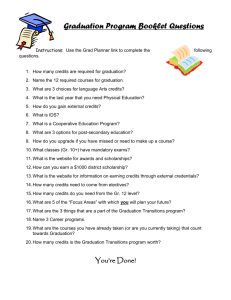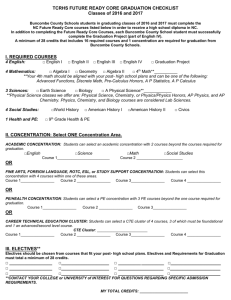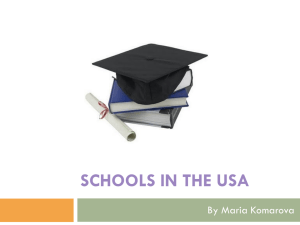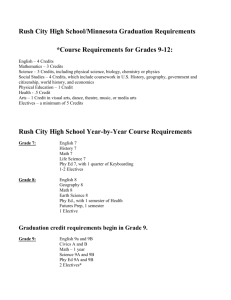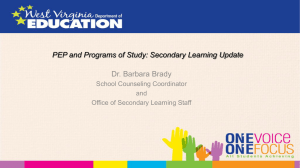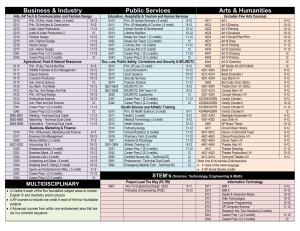WV Graduation Requirements - West Virginia Department of Education
advertisement
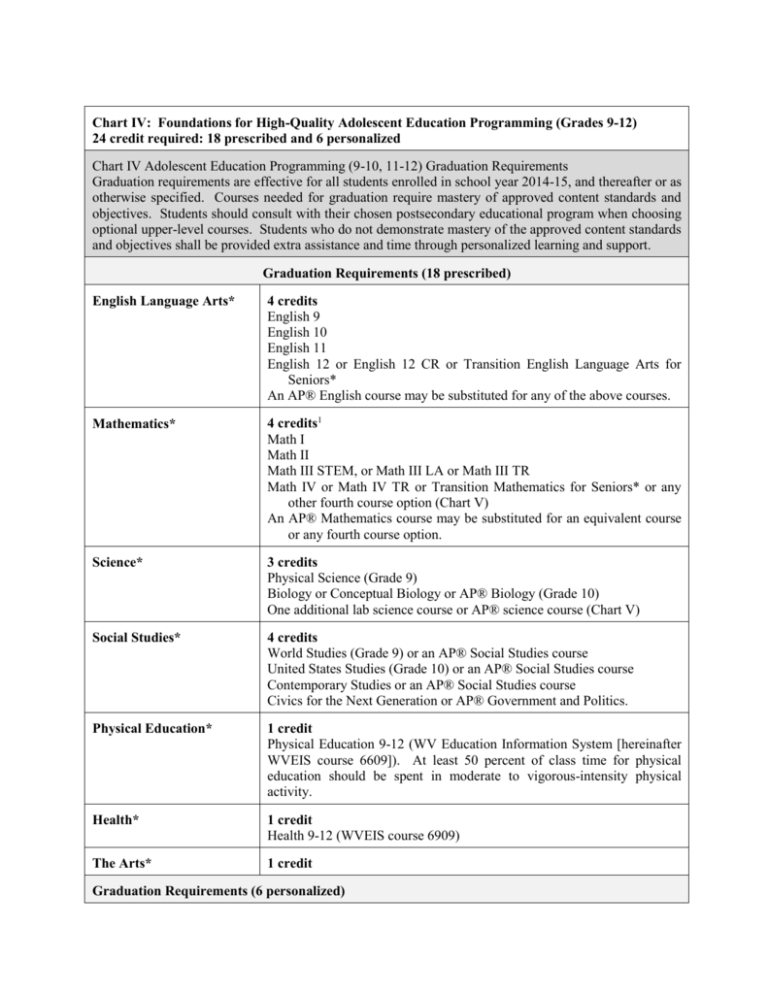
Chart IV: Foundations for High-Quality Adolescent Education Programming (Grades 9-12) 24 credit required: 18 prescribed and 6 personalized Chart IV Adolescent Education Programming (9-10, 11-12) Graduation Requirements Graduation requirements are effective for all students enrolled in school year 2014-15, and thereafter or as otherwise specified. Courses needed for graduation require mastery of approved content standards and objectives. Students should consult with their chosen postsecondary educational program when choosing optional upper-level courses. Students who do not demonstrate mastery of the approved content standards and objectives shall be provided extra assistance and time through personalized learning and support. Graduation Requirements (18 prescribed) English Language Arts* 4 credits English 9 English 10 English 11 English 12 or English 12 CR or Transition English Language Arts for Seniors* An AP® English course may be substituted for any of the above courses. Mathematics* 4 credits1 Math I Math II Math III STEM, or Math III LA or Math III TR Math IV or Math IV TR or Transition Mathematics for Seniors* or any other fourth course option (Chart V) An AP® Mathematics course may be substituted for an equivalent course or any fourth course option. Science* 3 credits Physical Science (Grade 9) Biology or Conceptual Biology or AP® Biology (Grade 10) One additional lab science course or AP® science course (Chart V) Social Studies* 4 credits World Studies (Grade 9) or an AP® Social Studies course United States Studies (Grade 10) or an AP® Social Studies course Contemporary Studies or an AP® Social Studies course Civics for the Next Generation or AP® Government and Politics. Physical Education* 1 credit Physical Education 9-12 (WV Education Information System [hereinafter WVEIS course 6609]). At least 50 percent of class time for physical education should be spent in moderate to vigorous-intensity physical activity. Health* 1 credit Health 9-12 (WVEIS course 6909) The Arts* 1 credit Graduation Requirements (6 personalized) Personalized Education Plan 4 credits Each student’s PEP will identify course work for the four (4) credits that will lead directly to placement in entry-level, credit-bearing academic college courses, an industry-recognized certificate or license, or workforce training programs. Best practices encourage students to take at least 1 AP® and/or AC course with corresponding examination, a fourth Science credit, and 2 credits in one World Language, and/or four credits cumulating in acquisition of industry and recognized Career and Technical Education (hereinafter CTE) credential focused on career aspirations. Career and Technical Education (CTE)* The four credits taken in a career and technical concentration must be consistent with those identified for WVDE approved career and technical programs of study. (Refer to W. Va. 126CSR44M, Policy 2520.13: Common Core Content Standards for Career and Technical Education in West Virginia Schools.) Each career and technical concentration in a school shall provide students the opportunity to obtain an industry recognized credential as part of the instructional program when applicable. School systems wishing to offer a concentration outside of the state approved CTE concentrations, must have four related courses approved by the local board of educations. 80 percent of students in grades 9-10 must have access to at least one career and technical foundation course. One foundation course must be offered that teaches parenting skills. 30 percent of students in grades 11-12 must have access to four units in a career and technical concentration and two career and technical electives. An additional 30 percent of students in grades 11-12 must have access to two units in a career and technical concentration. Approved WV Career Clusters Agriculture, Food and Natural Resources Architecture and Construction Arts, A/V Technology and Communication Business Management and Administration Education and Training Finance Government and Public Administration Health Sciences Hospitality and Tourism Human Services Information Technology Law, Public Safety, Correction and Security Manufacturing Marketing Science, Technology, Engineering and Mathematics Transportation, Distribution and Logistics Students with disabilities may earn 4 credits in Community Readiness Training recommended through an IEP Team as a personalized concentration. World Languages Communicating in a global society requires students to apply appropriate language strategies through embedded opportunities to explore and gain an understanding of the world around them. Undergraduate admission to West Virginia four-year colleges and universities include the completion of two units of the same world language. Electives 2 Credits The remaining graduation requirements are to be electives. When choosing electives, students should consult with their chosen postsecondary educational program to make sure the electives are acceptable. Developmentally Appropriate Practices for Student Success and Career Readiness Career Development All students in grades 9-12 will be provided structured, on-going experiences for career exploration, decision making, and career preparation. Career development shall be an integrated approach, engaging all staff in assisting students during the school day to explore the 16 career clusters. Career exploration will include opportunities for students to discover their interests in emerging careers including STEM careers in science, oil & gas, technology, engineering, and math. The school will engage student advisors in utilizing each student’s career awareness activities to develop the PEP. Advisors will assist students and their parents to utilize their various interests, learning styles, career and academic assessments to guide educational planning and career choices. Career exploration activities will be documented in each student’s personalized career portfolios. Comprehensive School Counseling Program A standards-focused, integrated, comprehensive and developmental school counseling program will assist students with the acquisition of school success and career readiness skills to prepare for high school and postsecondary success. School counselors will work collaboratively with other school staff to assist students with academic and postsecondary planning that leads to seamless transitions to the identified postsecondary options. Refer to WVBE Policy 2315 to ensure alignment with policy requirements. Student Advocate/Advisor/Mentor High schools will implement an advisory system that provides students with meaningful supportive relationships and maximizes each student’s personalized learning experience. An adult advocate, advisor, or mentor will take an interest in each student’s successful learning, goal setting, career planning and personal growth. The advisory system shall be evidence based and systemically integrate school success and career readiness skills (e.g., work, ethic, communication skills, team work, collaborative skills, personal responsibility, social skills, organization, financial literacy, and study skills). Physical Activity High schools should recognize that healthy lifestyles and academic success are tightly interwoven. Therefore, schools should promote wellness activities that extend beyond the course requirements for physical education and health. This may be accomplished through programs that focus on skill development, sportsmanship and teamwork. Opportunities should be provided for 30 minutes of moderate to vigorous integrated physical activity daily to keep high school students physically active throughout the school year. Wellness education should target the widespread behaviors that undermine the health and resulting capacity for personal success during adolescence. Students in grades 9-12 will be provided regular opportunities within the context of normal course work to master the standards set forth in WVBE Policy 2520.14. The infrastructure of classrooms should infuse technology and pedagogy to transform instruction, thus leading to improved student engagement. It is recommended that all students complete an online learning experience during grades 9-12. Students must be provided opportunities for advanced technology applications. *See Adolescent Guidance Document Technology


